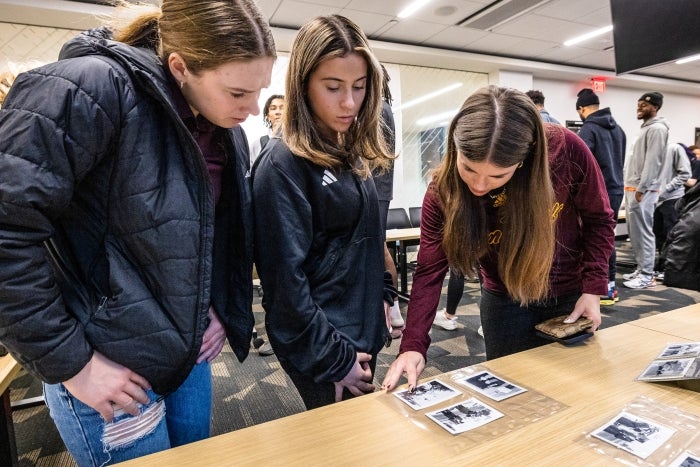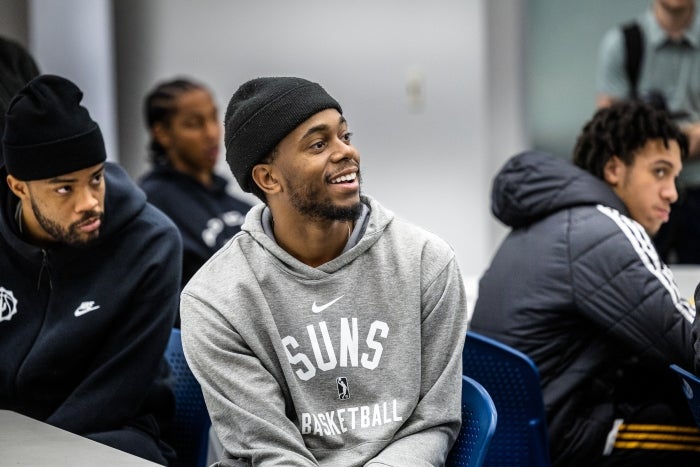Local athletes get crash course on Black history in Arizona

Kenja Hassan, assistant vice president for government and community engagement at ASU, talks about MLK and Black history in Arizona with members of the Valley Suns, ASU athletes and others on Monday, Jan. 6, in Durham Hall. Photo by Charlie Leight/ASU News
Basketball players from Arizona State University and the Valley Suns gathered on Jan. 6 to learn about Black history in Arizona and Martin Luther King Jr.’s visit to ASU's Tempe campus in 1964.
The Valley Suns, one of 31 teams in the NBA’s developmental G League, participated in the event as part of its monthly community outreach. The team, affiliated with the Phoenix Suns, is based at Mullett Arena at ASU.
The professional players — joined by members of the Sun Devil basketball team and other ASU athletes, plus alumni, faculty, staff and city of Tempe officials — started their educational visit at a mural in the lobby of Durham Hall that commemorates King’s speech at ASU in 1964.
The speech was lost until 2014, when a Phoenix resident found a box of reel-to-reel tapes at Goodwill. One of them was a recording of King’s speech, in which he urged the passage of the Civil Rights Act.
Mark Brantley, assistant director of operations for the School of International Letters and Cultures at ASU, had the idea for the exhibit in Durham Hall, named after G. Homer Durham, the president of ASU who invited King to campus.
“That was a bold step to invite King during this turbulent time,” Brantley said.
Kenja Hassan, assistant vice president of government and community engagement at ASU, led the visit, telling the group that the invitation to King was not a popular decision.
“Eight thousand people came to hear Dr. King speak here, but it did go against what was happening at the time because the times were very much focused on the maintenance of the social hierarchy, which quite frankly didn’t include Black people being at higher levels of that social hierarchy,” she said.
The group also visited the Black Collections, part of the Community-Driven Archives Initiative at ASU's Hayden Library. Jessica Salow, assistant archivist of Black Collections, told the group that only about 2% of known archival collections in the state represent Black and African American people.
“We have been here as Black and African American people since territorial times, and our history is woefully under documented,” Salow said.
She presented several photographs of civil rights history in Phoenix, including Lincoln Ragsdale Sr., a businessman, former Tuskegee airman and activist; the visit to Phoenix by Jesse Jackson in the 1980s; as well as protesters being arrested by police officers.
“What this history documents here is that we had legendary people in Arizona doing legendary work,” Hassan said. “Civil rights didn’t just happen in the southeastern states — it happened here.”
Several photographs depicted demonstrations about the Martin Luther King Day holiday, and the group discovered how sports institutions were drivers of social change in the state.
In 1986, Arizona adopted the holiday, but a year later, Gov. Evan Mecham canceled it. That led to boycotts of the state, affecting the tourism industry. On the ballot twice in 1990, voters rejected it. After that, the NFL moved the 1993 Super Bowl from Arizona to California over the issue. In 1992, voters approved the holiday.
After visiting the Black Collections, the group heard from Tempe Mayor Corey Woods, the first Black mayor elected in the city, and Tempe City Council member Berdetta Hodge, the first Black woman elected to the council. Both are ASU alumni and talked about moving the city forward.
They explained how Tempe was once a “sundown town,” and restricted Black people from buying homes in the city. Many state and local officials in the 1920s were members of the Ku Klux Klan, and several parks and streets were named after them.
Woods said the city formed a committee that included historians to work on renaming these landmarks. Sometimes family members objected.
“They would say, ‘My grandfather wasn’t in the Klan,’” Woods said. “Actually, he was the treasurer."
"You have to present the facts as to why you’re doing this. We actually had receipts about what these folks did," Woods said. "It sends a very strong message about who we are and what our values are in this community and that we’re not going back to that place in time.”
Hodge, who grew up in Tempe, told the crowd that when she was 16, she met the civil rights icons Coretta Scott King, Rosa Parks and Maya Angelou. Hodge said Parks told her: “We have opened the door for you. You’re going to walk through that door. Who will you open that door for?”
The young adults were reminded to think about their own family history and talk to their elders as a start to archiving their community’s past.
“If we can’t grasp the information from the past, then younger generations can believe whatever is told to them,” Hassan said.
Valley Suns guard Kaleb Johnson, who is from Virginia, said he enjoyed the event.
“Before coming here, I didn’t know that Martin Luther King came to Arizona and to ASU and Tucson. All of this is great and eye-opening,” he said.
He appreciated hearing about the importance of personal and family history.
“There were coaches that had a profound impact on my life, and then I think about my father and looking up to him doing the right thing and trying to be a good man that I really took with me through my life,” he said.
More Sun Devil community

How Kenny Dillingham remade ASU's football team in just 1 year
When Arizona State University football coach Kenny Dillingham went about rebuilding his roster after a 3-9 season in 2023, the most difficult thing he had to do was say no.Dillingham knew the Sun…

Double major fulfills childhood dream of learning French
Editor’s note: This story is part of a series of profiles of notable fall 2024 graduates.“When I was in sixth or seventh grade, I just decided that I needed to know French and I really…

Fulton Schools awards first data science doctoral degree
Editor’s note: This story is part of a series of profiles of notable fall 2024 graduates.This is a world where nearly every communication, transaction and interaction leaves a digital trace…

